In today’s hectic world, maintaining good health and fitness is very challenging, especially for women juggling in multiple roles. Women’s roles are changing exceptionally, they must also care for their health. Ensuring your body gets the right nutrients is key to staying energetic, strong, and balanced. In this blog, we’ll explore five essential nutrients every woman needs to support overall health, boost immunity, and thrive at every stage of life.
Women are the pillar of strength of every society. In our Indian culture, the role of a woman is significant, they are the support system for the men, caregivers to little ones and elders, and running the home. These days women have actively joined the workplaces, contributing to economic growth but still many burdens fall on women. They are equally participating in politics, leadership, boardroom and business.
Contents
- 1 Understanding Nutritional Needs: Why They Matter for Women
- 2 Essential Nutrition for Women’s Health
- 3 Conclusion: The Path to Optimal Health Starts with the Right Nutrients
Understanding Nutritional Needs: Why They Matter for Women
Healthy and nutritious meal acts like fuel. Due to their wide area of responsibility, women keep on juggling between work and home and put their health in the back seat. In the different phases of life, women’s nutrition needs change. Their nutrition needs are different from men. The nutrition role in women’s lives cannot be denied as women go through many changes in life from physical to physiologically. Women face many health-related issues related to hormonal imbalance, reproductive health, muscle weakness, bone health, low stamina or energy. The proper nutrition can help them to sustain their weight, prevent bone loss, boost immunity, increase energy levels, and prevent heart disease.
Essential Nutrition for Women’s Health
The Needs of nutrition in women’s lives vary at different phases of their lives. For example in the initial stage when a woman is menstruating, she needs more iron-rich food to cover up the blood loss. At the time when she is about to be a mother and breastfeeding, she needs more folic acid, calcium and iron. Post menopause, women need more Vitamin D and calcium for bone health. Essential nutrients for women’s health are :
1. Iron: The Key to Energy and Vitality
Iron-rich food plays an important role in women’s lives. It’s an essential nutrient which our body needs for growth and development. Iron is a mineral which our body requires to make hemoglobin a protein in red blood cells. Red blood cells carry oxygen to the entire body parts. Iron helps to make healthy muscle, bone marrow and organ function. Due to blood loss at mensuration, it a necessary for a woman to have iron-rich food.
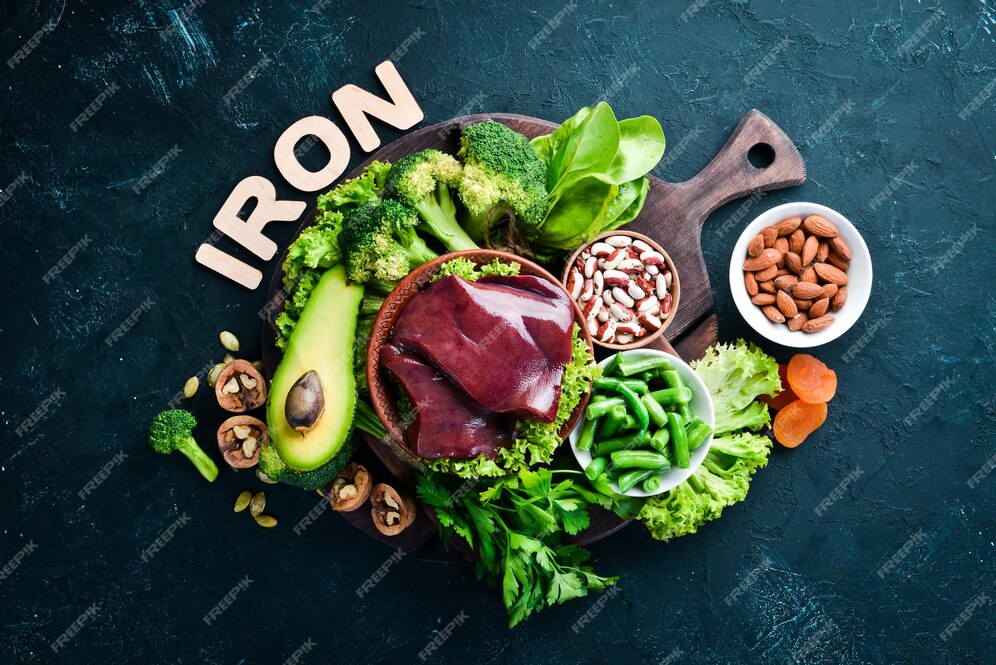
Deficiency Can Cause:
The deficiency of iron is called anaemia. Many factors can be the reason for iron deficiency like blood loss during menstruation or childbirth, frequent blood donors, and lack of balanced meals during pregnancy. Women face many issues with iron deficiency for example pale skin, lack of energy, shortness of breath, and difficulty in concentration.
Recommended Daily Dose:
Iron requirements are different at each phase of life. According to the National Institute of Health, the daily requirement of iron depends on age, gender and those who are pregnant and lactating.
Females between 9-13 years need 08 mg of iron, 14-18 years need 15mg, and 19 – 50 years need 18 mg. At the time of pregnancy, women need 27 mg. While breastfeeding at younger than 18 years, 10mg and older than 19 years, 09 mg. 50 years and above need 08mg of iron every day.
Men need 08-11 mg iron every day on the other hand children need 7 – 10 mg. Infants from 0 – 6 months required 0.27mg and from 7-12 months 11 mg iron every day.
Best Source
In India, we have different dietary preferences. Some are vegetarian and others are non-vegetarian so please check iron sources for both below :
Vegetarian Sources :
Legumes including beans, peas and lentils are good sources of iron. Red kidney beans, soybeans, chickpeas, white beans, black-eyed peas. In nuts and dry fruits, sesame seeds, pumpkin seeds, flax seeds, cashews, and almonds are rich in iron. Spinach, broccoli, potato, and white mushrooms have high amounts of iron. Amaranth, quinoa, oats, coconut milk and tofu.
Non Vegetarian Sources :
Fish, organ meat, red meat, oyster, shellfish. Non-vegetarians can include vegetarian food options in their diet.
How to Incorporate into Your Routine
A spinach omelette and spinach smoothie can be considered a good option for breakfast. Pumpkin seed is a perfect snack option. Add citrus fruits or food rich in Vitamin C for better iron absorption. Avoid tea or coffee with meals that can inhibit iron absorption.
2. Calcium: Building Strong Bones for a Healthy Future
Calcium is a vital mineral for our body which helps to build and maintain strong teeth and bones. The body stores 98% calcium in the bones and teeth. It plays a crucial role in blood clotting, nerve transmission ( Sending and receiving nerve signals ), and muscle contraction. Calcium helps in regulating a normal heartbeat and hormone release, making it essential for overall well-being. Women in the menopause phase need more calcium because menopause causes weak bone and bone density loss.
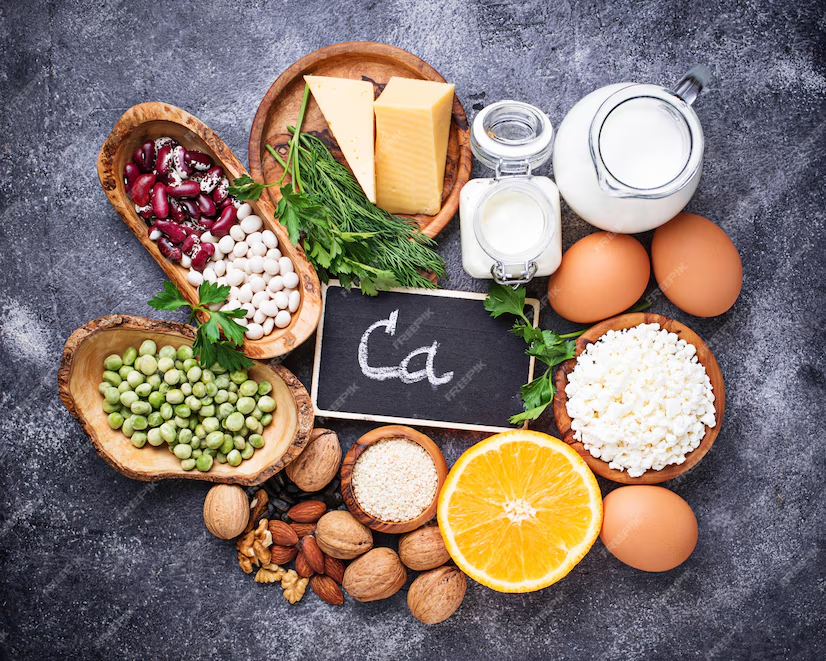
Deficiency Can Cause:
Calcium deficiency can lead to a situation where the bone tends to get weak and can be prone to fractures, it’s called Osteoporosis. There is one more condition called Osteomalacia, a condition which causes soft bones in children and adults. Deficiency of calcium can lead to many dental-related issues, Muscle cramps and spasms. During pregnancy, calcium decay can lead to adverse effects for both the mother and the baby, Muscle cramping, Delayed fetal growth, and Low birth weight.
Recommended Daily Dose:
According to the National Institute of Health, the daily calcium requirements for women, children, and men are below.
| Age | Male | Female | Pregnant | Lactating |
|---|---|---|---|---|
| 0–6 months* | 200 mg | 200 mg | ||
| 7–12 months* | 260 mg | 260 mg | ||
| 1–3 years | 700 mg | 700 mg | ||
| 4–8 years | 1,000 mg | 1,000 mg | ||
| 9–13 years | 1,300 mg | 1,300 mg | ||
| 14–18 years | 1,300 mg | 1,300 mg | 1,300 mg | 1,300 mg |
| 19–50 years | 1,000 mg | 1,000 mg | 1,000 mg | 1,000 mg |
| 51–70 years | 1,000 mg | 1,200 mg | ||
| >70+ years | 1,200 mg | 1,200 mg |
*Adequate Intake (AI)
Best Source
Calcium is usually found in many food items. Dairy products are considered the best source of calcium.
Vegetarian Source :
The dairy products that provide calcium include milk, yogurt, paneer, tofu, and cheese. Chia seeds, Poppy seeds, and Sesame seeds contain calcium. Calcium can be obtained from leafy greens like Kale, Broccoli, and Spinach. Plant-based milk (almond, soy, or oatmeal) and calcium-fortified cereals are all foods that have calcium added.
Non Vegetarian Source :
For non-vegetarians, calcium can be obtained from fish like salmon and sardines and eggs.
How to Incorporate into Your Routine:
One bowl of yogurt with chia seeds topping can be the perfect breakfast option. Pairing it with fruit-like oranges can also enhance the absorption of calcium. sesame seeds can be added at snack time. Spinach, Broccoli, paneer, and tofu can be added as main dishes at lunchtime. Reduce caffeine and salt consumption throughout the day to prevent interference with calcium absorption.
3. Vitamin B12: Supporting Brain and Nerve Function
Vitamin B12 is a water-soluble vitamin. It is usually found in meat, fish and dairy products. This vitamin is stored in the liver. It helps in the formation of red blood cells and maintains the human nervous system, supporting DNA synthesis and managing typical brain functions. It is very crucial for pregnant and breastfeeding mothers and their babies as this mineral helps in brain development, red blood cell formation, and other functions.
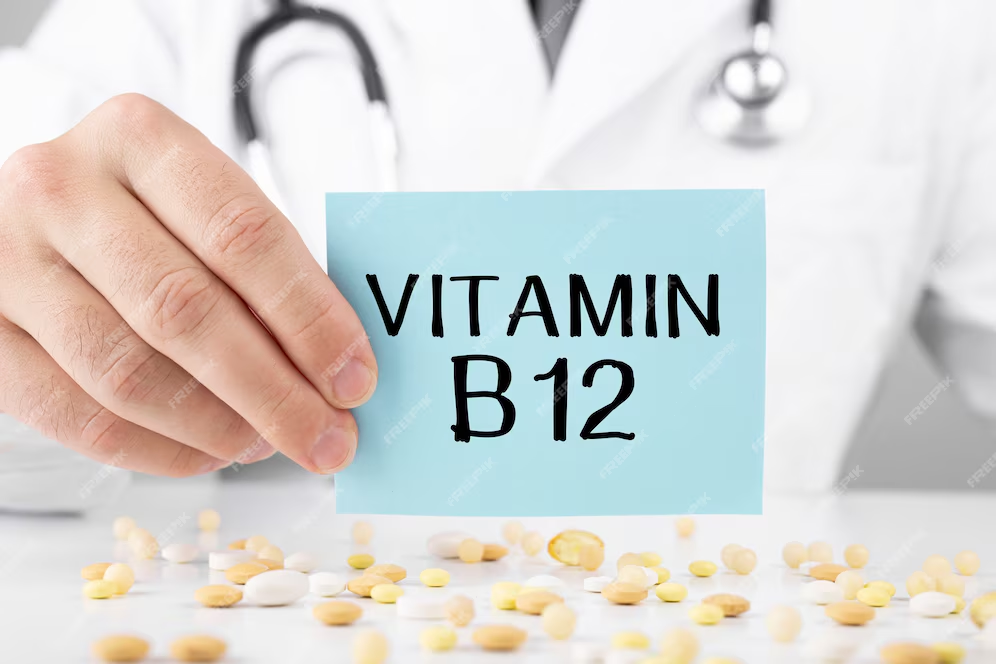
Deficiency Can Cause:
Mainly vegetarians and vegan tends to get a deficiency. During pregnancy, Vitamin B12 is essential for the proper formation of the baby’s brain, spinal cord, and nervous system. Deficiency of this at this phase can increase the risk of birth defects affecting the brain. It helps to maintain good energy levels for breastfeeding mothers and pregnant ladies Many other health issues can be raised from its deficiency like anaemia, memory issues, nerve damage, and developmental delay.
Recommended Daily Dose:
Recommendations for vitamin B12, as well as other nutrients, are provided in the Dietary Reference Intakes (DRIs) developed by the Food and Nutrition Board at the National Academies of Sciences, Engineering, and Medicine.
| Age | Male | Female | Pregnancy | Lactation |
| Birth to 6 months* | 0.4 mcg | 0.4 mcg | ||
| 7–12 months* | 0.5 mcg | 0.5 mcg | ||
| 1–3 years | 0.9 mcg | 0.9 mcg | ||
| 4–8 years | 1.2 mcg | 1.2 mcg | ||
| 9–13 years | 1.8 mcg | 1.8 mcg | ||
| 14–18 years | 2.4 mcg | 2.4 mcg | 2.6 mcg | 2.8 mcg |
| 19+ years | 2.4 mcg | 2.4 mcg | 2.6 mcg | 2.8 mcg |
Best Source
Vitamin B12 is a vitamin we usually get from non-vegetarian products like meat, fish, eggs, and organ meat. Vitamin B12 is generally not present in plant foods.
Vegetarian Source :
Dairy products like Low-fat milk, yogurt, and Swiss cheese are good sources of it. Eggs have 0.6 mcg which is 25% of daily vitamin needs. Food fortified with B12 like breakfast cereals, plant-based milk, and nutritional yeast.
Non Vegetarian Source :
Animal meat like liver and kidneys, especially from lamb, are rich in vitamin B12. Fish like Salmon, tuna, and sardines are also good sources of it. Vitamin B12 can be obtained from shellfish like Clams, crabs, and shrimp.
How to Incorporate into Your Routine:
Breakfast cereals fortified with vitamin B12 can be taken with low-fat milk. Non-vegetarians can add lean meats or fish to lunch or dinner. While vegetarians can take dairy products and eggs. Including a serving of fortified plant-based milk or nutritional yeast can be particularly useful for vegans and vegetarians.
4. Magnesium: The Essential Mineral for Overall Health
Magnesium is a mineral that’s crucial for the body’s functions. Magnesium is essential for maintaining normal blood pressure, bone strength, and steady heart rhythm. It is also responsible for controlling your blood sugar levels and generating proteins and DNA. Magnesium can be beneficial for improving your mood, sleep, and exercise performance.
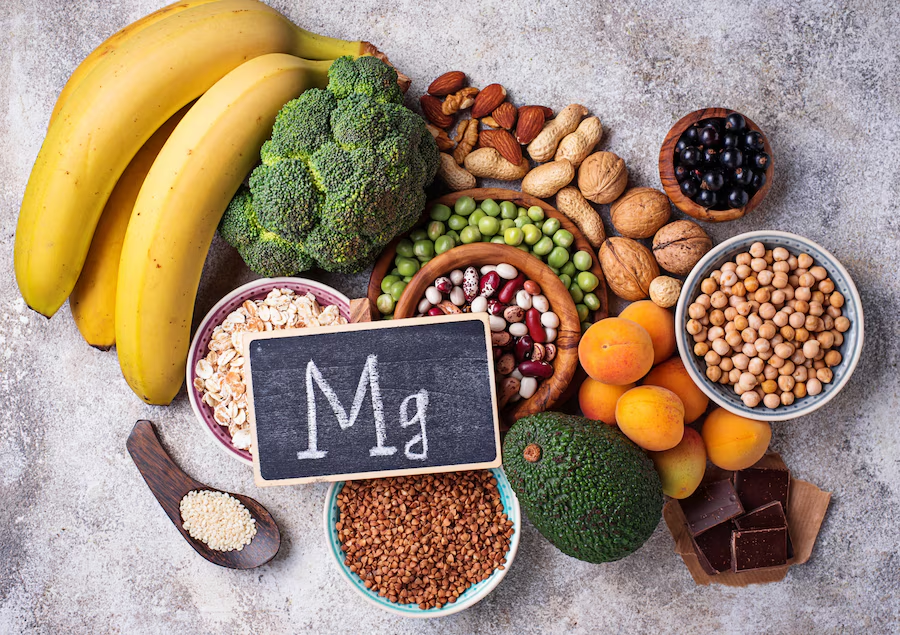
Deficiency Can Cause:
Depression may be caused by magnesium deficiency. Magnesium is important for the growth of the fetus and uterus. Magnesium aids in the creation of tissues, muscles, and bones. It contributes to developing the baby’s nervous system and ensures proper cell division during pregnancy. Pregnant women usually experience leg cramps, muscle spasms, and nausea. Magnesium supplementation can relieve these symptoms by relaxing the muscles and calming the nervous system. Both the mother and the fetus can benefit from magnesium, which aids calcium absorption and promotes strong bone development. It is crucial to do this as pregnancy puts more demands on the mother’s calcium stores.
‘’
Recommended Daily Dose:
The amount of magnesium you need depends on your age and gender. The average recommended daily amounts are listed below in milligrams (mg).
Recommended Dietary Allowances (RDAs) for Magnesium
| Age | Male | Female | Pregnancy | Lactation |
| Birth to 6 months | 30 mg* | 30 mg* | ||
| 7–12 months | 75 mg* | 75 mg* | ||
| 1–3 years | 80 mg | 80 mg | ||
| 4–8 years | 130 mg | 130 mg | ||
| 9–13 years | 240 mg | 240 mg | ||
| 14–18 years | 410 mg | 360 mg | 400 mg | 360 mg |
| 19–30 years | 400 mg | 310 mg | 350 mg | 310 mg |
| 31–50 years | 420 mg | 320 mg | 360 mg | 320 mg |
| 51+ years | 420 mg | 320 mg |
Best Source
Vegetarian Source :
Dark chocolates, tofu, banana, broccoli, avocado & green leafy vegetables like spinach and kale are good sources of it. In nuts and seeds, almonds, cashews, Brazil nuts, flax seeds, pumpkin seeds and chia seeds are high in magnesium. The use of whole grains like wheat, oats, and barley, as well as pseudocereals like buckwheat and quinoa, is a reliable source of several nutrients, including magnesium. Magnesium can be obtained from Lentils, beans, chickpeas, peas, and soybeans.
Non Vegetarian Source :
Salmon, tuna, mackerel, and halibut are all good sources of magnesium. Shellfish like shrimp and crab can be taken for magnesium.
How to Incorporate into Your Routine:
Adding magnesium-rich food to all meals can fulfil the daily requirements of it. Oats meal with almonds and pumpkin seeds can be a great breakfast. For lunch, leafy greens like spinach or kale in salads, with legumes like black beans. At the time of Snacking nuts or dark chocolate is another easy way to boost magnesium intake. Incorporating fish or whole grains into dinner provides additional sources for non-vegetarians.
5. Vitamin D: The Sunshine Vitamin for Immune Support
Vitamin D is a fat-soluble vitamin that helps to maintain overall health. The body produces vitamin D naturally in exposed to sunlight. Vitamin D has several significant functions. The most common functions are regulating the absorption of calcium, and phosphorus, facilitating healthy immune system function. It strengthens bones, and teeth, boosts immunity, and improves mood and mental health, reducing the risk of chronic illnesses like type 2 diabetes, cardiovascular disease, and certain cancers. Vitamin D is very crucial for pregnant women because it helps build the baby’s bones, teeth, kidneys, heart, and nervous system.
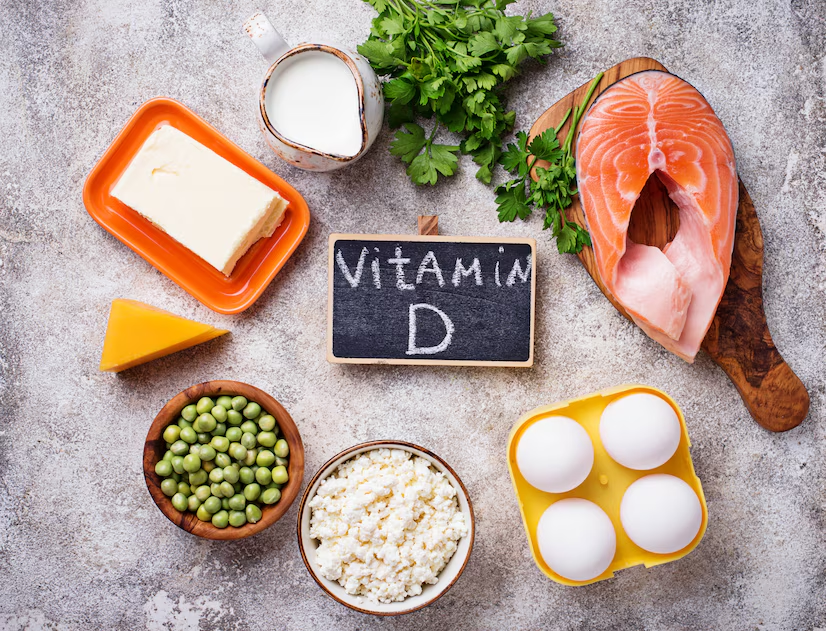
Deficiency Can Cause:
Vitamin D deficiency can lead to many health problems like bone problems, muscle weakness, cramps, low energy levels, frequent infection due to low immunity, depression, hair loss. Vitamin D deficiency is usually associated with a higher risk of preterm birth, low birth weight, and preeclampsia. Its deficiency can lead to bone abnormalities like rickets in infants, and increased risk of gestational diabetes mellitus.
Recommended Daily Dose:
RDAs ( Recommended Dietary Allowance ) for vitamin D are listed in both micrograms (mcg) and International Units (IU); 1 mcg of vitamin D is equal to 40 IU.
| Recommended Dietary Allowances (RDAs) for Vitamin D | ||||
| Age | Male | Female | Pregnancy | Lactation |
| 0-12 months* | 10 mcg | 10 mcg | ||
| (400 IU) | (400 IU) | |||
| 1–13 years | 15 mcg | 15 mcg | ||
| (600 IU) | (600 IU) | |||
| 14–18 years | 15 mcg | 15 mcg | 15 mcg | 15 mcg |
| (600 IU) | (600 IU) | (600 IU) | (600 IU) | |
| 19–50 years | 15 mcg | 15 mcg | 15 mcg | 15 mcg |
| (600 IU) | (600 IU) | (600 IU) | (600 IU) | |
| 51–70 years | 15 mcg | 15 mcg | ||
| (600 IU) | (600 IU) | |||
| >70 years | 20 mcg | 20 mcg | ||
| (800 IU) | (800 IU) | |||
Best source
Vegetarian Source:
Sunshine, mushrooms, egg york, cheese, fortified plant-based products, orange juice. Plant milk like soy, oat, or almond milk are often fortified with vitamin D.
Non Vegetarian Source :
Vitamin D can be obtained from fatty fish like salmon, mackerel, and tuna, as well as cod liver oil, eggs, red meat, and liver.
How to Incorporate into Your Routine:
The best way to get Vitamin D is Sunlight. Spending 15-20 minutes in sunlight without sunscreen can help in maintaining Vitamin D. Fortified foods, mushrooms, eggs and fatty fish can be incorporated into the diet.
Conclusion: The Path to Optimal Health Starts with the Right Nutrients
To maintain good health and avoid any deficiencies, a balanced and nutrition-rich diet plays an important role for women. Adding different types of foods like fruits, vegetables, whole grains, legumes, nuts and seeds, and dairy products is needed so that all types of nutrition can be obtained from the diet. Incorporating a variety of colourful vegetables and fruits is essential for optimal health. Fortified foods and plant-based protein can’t be skipped from the list. Keep hydrating and skip processed food as much as possible. By following these tips, women can take an accurate approach to eating right, ensuring they get the vital nutrients.
Maintaining optimal health isn’t about short-term goals, it’s about consistently nourishing the body with the right nutrients. Crucial roles in supporting bone strength, immune function, and mental well-being are played by key vitamins and minerals like iron, calcium, vitamin B12, magnesium, and vitamin D for women.
A balanced, nutrient-rich diet is needed for every woman, especially for long-term fitness goals. Women can achieve well-being by focusing on proper nutrition, whether they are trying to manage deficiencies, support pregnancy, or want to feel more energetic.
Women can change their health journey by incorporating nutrient-dense foods. Ultimately, small, consistent changes to diet and lifestyle lead to lasting results. Any woman can get good health with the right knowledge and habits.
If I missed any essential nutrients or you have suggestions, let me know in the comments! A special thanks to Ghazala for her guidance—follow her on Instagram @ healthiely_by_ghazala

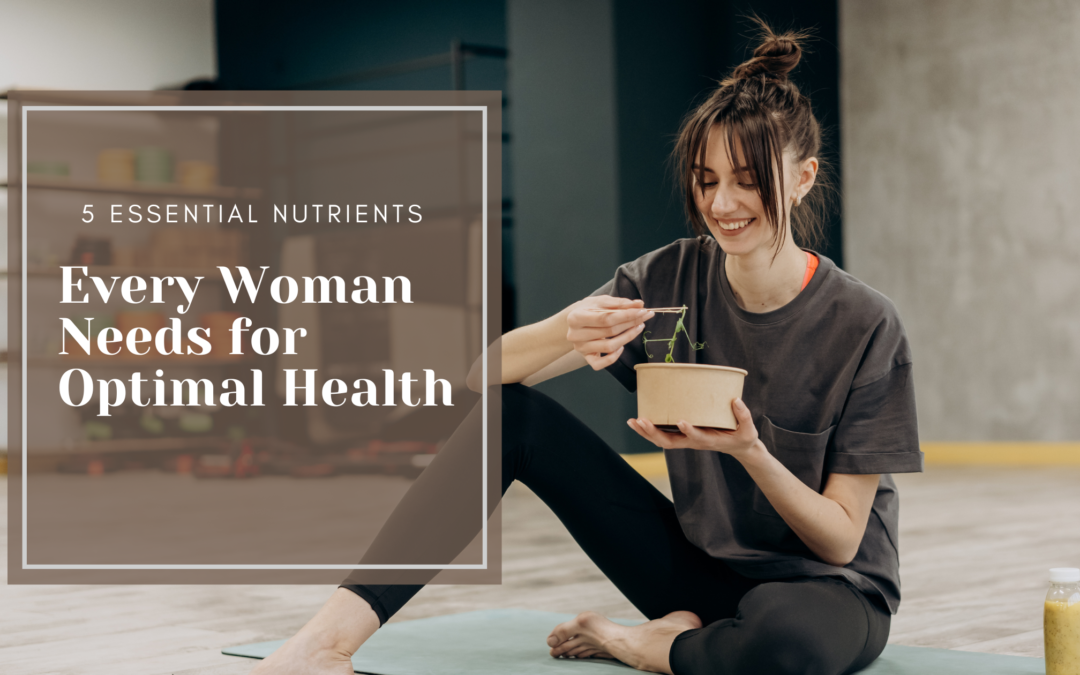

it’s really an amazing content and worth reading it🥰
Thank you so much Priya, your appreciation means a lot 🙂